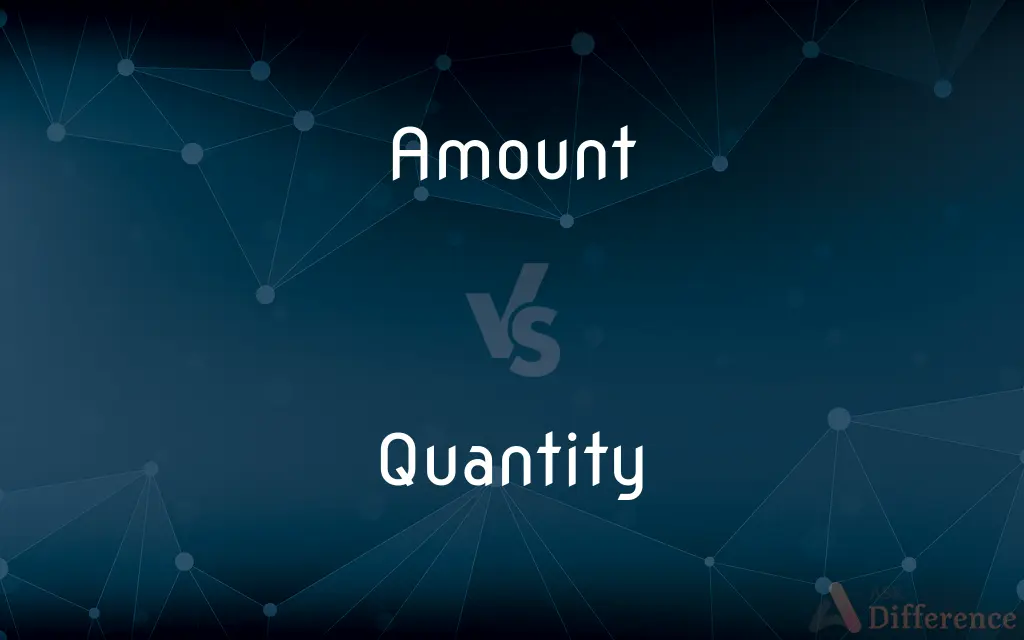Amount vs. Quantity — What's the Difference?
Edited by Tayyaba Rehman — By Urooj Arif — Updated on March 11, 2024
Amount refers to the total of something, often used with uncountable nouns, while quantity specifies a measurable number of countable items.

Difference Between Amount and Quantity
Table of Contents
ADVERTISEMENT
Key Differences
The term "amount" is used when referring to a total of something that cannot be individually counted, typically associated with uncountable nouns such as water, sand, or information. It emphasizes the idea of a collective or total mass without focusing on individual units. "Quantity," on the other hand, relates to a specific, measurable number of items that are countable and often refers to the size or extent of a batch or lot. It is used with nouns that can be enumerated, such as books, apples, or cars.
In everyday language, "amount" and "quantity" might be used interchangeably, but their proper use depends on whether the items in question are countable or uncountable. Understanding the distinction between these terms is important for clarity, especially in writing or when precise communication is required.
While both "amount" and "quantity" can express volume, "amount" is more abstract, often used in contexts where precision is not the focus. "Quantity" demands specificity and is crucial in contexts where the exact count or measure is significant, such as in commerce, science, and technical descriptions.
"Amount" is suitable for uncountable nouns and emphasizes a collective mass, whereas "quantity" is appropriate for countable nouns and emphasizes an exact count or measure.
Comparison Chart
Nouns Used With
Uncountable (e.g., milk, sand, information)
Countable (e.g., books, apples, cars)
ADVERTISEMENT
Emphasis
Total mass or collective without individual units
Specific, measurable number of items
Contexts
Abstract, non-specific totals
Precise counts, measurements
Examples
"The amount of sugar in the recipe."
"The quantity of screws in the box."
Suitability
When precision is not the focus
When exact count or measure is significant
Compare with Definitions
Amount
Amount refers to the total mass or volume of uncountable nouns.
The recipe needs a small amount of salt.
Quantity
Quantity specifies a measurable number of countable items.
Please check the quantity of books ordered.
Amount
It is used when individual units are not distinct.
The amount of pollution in the city has increased.
Quantity
It is used with items that can be individually counted.
The quantity of tickets available is limited.
Amount
Amount is appropriate for substances or qualities.
Adjust the amount of lighting for better photography.
Quantity
It is crucial for inventory and logistics.
The warehouse stores a large quantity of goods.
Amount
Amount can imply a level or degree.
The amount of effort you put into this project is commendable.
Quantity
Quantity can refer to mathematical or scientific measures.
The experiment requires a precise quantity of chemicals.
Amount
It often relates to abstract concepts.
The amount of happiness she brings to the room is immeasurable.
Quantity
Quantity demands specificity and precision.
The recipe specifies the quantity of each ingredient needed.
Amount
A quantity of something, especially the total of a thing or things in number, size, value, or extent
The substance is harmless if taken in small amounts
Sport gives an enormous amount of pleasure to many people
Quantity
Quantity or amount is a property that can exist as a multitude or magnitude, which illustrate discontinuity and continuity. Quantities can be compared in terms of "more", "less", or "equal", or by assigning a numerical value in terms of a unit of measurement.
Amount
Come to be (the total) when added together
Losses amounted to over 10 million pounds
Quantity
The amount or number of a material or abstract thing not usually estimated by spatial measurement
The quantity and quality of the fruit can be controlled
Amount
The total of two or more quantities; the aggregate.
Quantity
The perceived length of a vowel sound or syllable.
Amount
A number; a sum.
Quantity
A value or component that may be expressed in numbers.
Amount
A principal plus its interest, as in a loan.
Quantity
A specified or indefinite number or amount
Shipped a large quantity of books.
Sells quantities of paper to publishers.
Amount
The full effect or meaning; import.
Quantity
A considerable amount or number
Sells drugs wholesale and in quantity.
Amount
Quantity
A great amount of intelligence.
Quantity
An exact amount or number
The quantity of material recycled in a month.
Amount
To add up in number or quantity
The purchases amounted to 50 dollars.
Quantity
The measurable or countable property or aspect of things
Arithmetic deals with quantity.
Amount
To add up in import or effect
That plan will never amount to anything.
Quantity
(Mathematics) Something that serves as the object of an operation.
Amount
To be equivalent or tantamount
Accusations that amount to an indictment.
Quantity
(Linguistics) The relative amount of time needed to pronounce a vowel, consonant, or syllable.
Amount
The total, aggregate or sum of material not applicable to discrete numbers or units or items in standard English.
The amount of atmospheric pollution threatens a health crisis.
Quantity
The duration of a syllable in quantitative verse.
Amount
A quantity or volume.
Pour a small amount of water into the dish.
The dogs need different amounts of food.
Quantity
(Logic) The exact character of a proposition in reference to its universality, singularity, or particularity.
Amount
The number (the sum) of elements in a set.
Quantity
A fundamental, generic term used when referring to the measurement (count, amount) of a scalar, vector, number of items or to some other way of denominating the value of a collection or group of items.
You have to choose between quantity and quality.
Amount
To total or evaluate.
It amounts to three dollars and change.
Quantity
An indefinite amount of something.
Some soap making oils are best as base oils, used in a larger quantity in the soap, while other oils are best added in a small quantity.
Olive oil can be used practically in any quantity.
Amount
To be the same as or equivalent to.
He was a pretty good student, but never amounted to much professionally.
His response amounted to gross insubordination
Quantity
A specific measured amount.
This bag would normally costs $497.50 for a quantity of 250, at a price of $1.99 per piece.
Generally it should not be used in a quantity larger than 15 percent.
Amount
To go up; to ascend.
Quantity
A considerable measure or amount.
The Boeing P-26A was the first all-metal monoplane fighter produced in quantity for the U.S. Army Air Corps.
Amount
To go up; to ascend.
So up he rose, and thence amounted straight.
Quantity
(metrology) Property of a phenomenon, body, or substance, where the property has a magnitude that can be expressed as number and a reference.
Amount
To rise or reach by an accumulation of particular sums or quantities; to come (to) in the aggregate or whole; - with to or unto.
Quantity
(mathematics) Indicates that the entire preceding expression is henceforth considered a single object.
X plus y quantity squared equals x squared plus 2xy plus y squared.
Amount
To rise, reach, or extend in effect, substance, or influence; to be equivalent; to come practically (to); as, the testimony amounts to very little.
Quantity
(phonology) Length of sounds.
Amount
To signify; to amount to.
Quantity
The attribute of being so much, and not more or less; the property of being measurable, or capable of increase and decrease, multiplication and division; greatness; and more concretely, that which answers the question "How much?"; measure in regard to bulk or amount; determinate or comparative dimensions; measure; amount; bulk; extent; size.
Amount
The sum total of two or more sums or quantities; the aggregate; the whole quantity; a totality; as, the amount of 7 and 9 is 16; the amount of a bill; the amount of this year's revenue.
Quantity
That which can be increased, diminished, or measured; especially (Math.), anything to which mathematical processes are applicable.
Amount
The effect, substance, value, significance, or result; the sum; as, the amount of the testimony is this.
The whole amount of that enormous fame.
Quantity
A determinate or estimated amount; a sum or bulk; a certain portion or part; sometimes, a considerable amount; a large portion, bulk, or sum; as, a medicine taken in quantities, that is, in large quantities.
The quantity of extensive and curious information which he had picked up during many months of desultory, but not unprofitable, study.
Amount
How much of something is available;
An adequate amount of food for four people
Quantity
How much there is of something that you can quantify
Amount
A quantity of money;
He borrowed a large sum
The amount he had in cash was insufficient
Quantity
An adequate or large amount;
He had a quantity of ammunition
Amount
How much there is of something that you can quantify
Quantity
Something that has a magnitude and can be represented in mathematical expressions by a constant or a variable
Amount
A quantity obtained by addition
Amount
Be tantamount or equivalent to;
Her action amounted to a rebellion
Amount
Add up in number or quantity;
The bills amounted to $2,000
The bill came to $2,000
Amount
Develop into;
This idea will never amount to anything
Nothing came of his grandiose plans
Common Curiosities
Is the distinction between "amount" and "quantity" important in everyday language?
While the distinction may not always be crucial in casual conversation, it becomes important in formal, academic, or technical contexts for clarity and precision.
How does "amount" relate to abstract concepts?
"Amount" can describe the degree or extent of abstract concepts, such as happiness or effort, where no physical measurement is possible.
Can "quantity" be used in a non-numeric sense?
"Quantity" generally implies a measurable, often numeric, aspect, making it less suitable for non-numeric contexts compared to "amount."
Is "amount" ever used with countable nouns?
In informal settings, "amount" might be used with countable nouns, but it's not grammatically standard.
How do I know when to use "amount" vs. "quantity"?
Use "amount" for uncountable nouns (like sand or water) and "quantity" for countable nouns (like books or apples).
Can "quantity" refer to a large volume of something uncountable?
Typically, "quantity" is not used for uncountable nouns, even in large volumes. Instead, terms like "volume" or "mass" might be more appropriate.
Can "amount" and "quantity" be used interchangeably?
While often used interchangeably in casual conversation, their proper use depends on the countability of the nouns they describe.
How does the use of "amount" and "quantity" affect communication in professional settings?
In professional settings, using these terms correctly can enhance clarity, precision, and professionalism in communication, especially in written documents and presentations.
How do cultural or regional differences impact the use of "amount" and "quantity"?
While there might be regional variations in casual speech, formal and written English tends to adhere to the standard distinctions between these terms.
Are there exceptions to the use of "amount" and "quantity"?
English has many exceptions due to its diverse influences and evolution, but sticking to the general rule of "amount" for uncountable nouns and "quantity" for countable nouns is advisable.
Share Your Discovery

Previous Comparison
Latitude vs. Longitude
Next Comparison
Hat vs. HutAuthor Spotlight
Written by
Urooj ArifUrooj is a skilled content writer at Ask Difference, known for her exceptional ability to simplify complex topics into engaging and informative content. With a passion for research and a flair for clear, concise writing, she consistently delivers articles that resonate with our diverse audience.
Edited by
Tayyaba RehmanTayyaba Rehman is a distinguished writer, currently serving as a primary contributor to askdifference.com. As a researcher in semantics and etymology, Tayyaba's passion for the complexity of languages and their distinctions has found a perfect home on the platform. Tayyaba delves into the intricacies of language, distinguishing between commonly confused words and phrases, thereby providing clarity for readers worldwide.














































